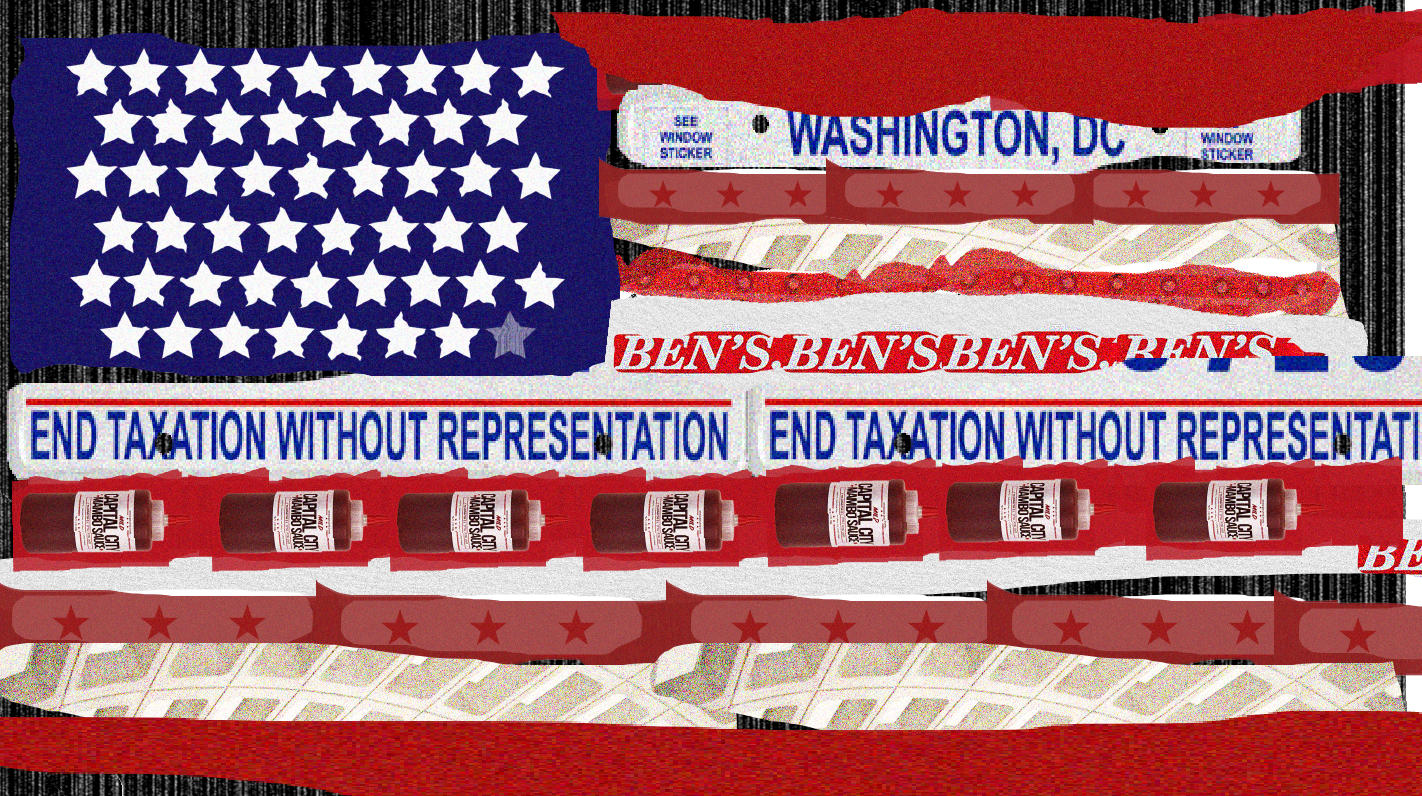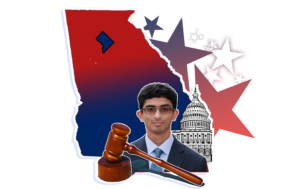On the campaign trail, Trump promised to “take over” D.C. and “make our capital beautiful again.”
That message, and Trump’s focus on D.C., does not inspire confidence for a capital city that is overwhelmingly Democratic. Without D.C. statehood, the incoming Republican trifecta—a combination of a Republican president, House of Representatives, and Senate—will have broad powers to influence D.C.’s local affairs. Local politicians and activists are preparing for what the next few years may mean for the city.
“District leaders need to focus on our strengths and what’s good about the District and of course be watchful that there’s no effort that gains traction that would diminish our authority,” Phil Mendelson, chairman of the D.C. Council, wrote in a statement to the Voice.
What have Trump and Republicans said about D.C.?
During his campaign, Trump repeatedly criticized D.C.
“We will take over the horribly run capital of our nation in Washington, D.C., and clean it up, renovate it and rebuild our capital city so there is no longer a nightmare of murder and crime,” Trump said at a campaign stop in Florida over the summer.
He has also threatened to take over the powers of local government officials.
“We’re going to take it away from the mayor. And again, that doesn’t make me popular there, but I have to say it,” Trump said at the same event.
Aside from Trump, the Republican party platform has also promised to “Make Washington D.C. the Safest and Most Beautiful Capital City.”
“Republicans will reassert greater Federal Control over Washington, DC to restore Law and Order in our Capital City, and ensure Federal Buildings and Monuments are well-maintained,” the platform reads.
What power will the Republican trifecta actually have over D.C.?
Because D.C. is not a state, the president can assume many of the powers typically exercised by the mayor and D.C. Council. One of these powers is control over the police force.
“There’s some worry that Donald Trump might try to take control of our police department, which, unfortunately, under the law, he has a little bit more authority to do than other things he’s talking about,” Ankit Jain, D.C.’s shadow-senator-elect, said. While the District does not have voting representation in either chamber of Congress, it has two shadow senators who work with members of Congress to lobby for D.C.’s interests.
In a state of emergency—which the president can declare—the president may take over the D.C. Metropolitan Police Department (MPD) for 48 hours, which can be extended with the approval of Congress.
“So what we’re talking about now is a police force controlled by Donald Trump that is cracking down on protests,” Jain said. “It’s probably going to be more abusive. A lot of the protections for people’s rights are going to be taken away.”
Jain worried that Trump may use control over law enforcement to suppress free speech activities and protests on topics like abortion rights or human rights in Palestine.
In addition to controlling MPD, Trump could also call in the National Guard and direct them to exercise law enforcement powers in D.C. In 2020, then-President Trump used the National Guard and federal authorities to clear peaceful Black Lives Matter protesters in D.C.
“If D.C. were a state, the mayor, the governor, would be in control of the National Guard,” Amber Taylor, communications director of the American Civil Liberties Union’s D.C. chapter, said. “We should not be having this conversation where the police, where the National Guard, the militarized forces, could potentially be in the District of Columbia. These are not things that should happen in a democratic society.”
Aside from law enforcement, the president also has the power to reinstate a so-called “Control Board” to run D.C.’s affairs. From 1995 to 2001, then-President Bill Clinton instated the Control Board to oversee finances in the District. The Board had the power to override decisions by the mayor and D.C. Council, and it was made up of five members appointed by the president.
If Trump declares either a fiscal or crime emergency, he could bring the Control Board back and pick his own appointees to run it.
“You can imagine Donald Trump’s cronies being appointed to the Control Board,” Jain said. “Look at who he’s appointed to the cabinet. I don’t think he’d appoint anyone better to the Control Board.”
Regarding the issue of political appointees, Trump has pledged to reinstate Schedule F, an executive order from near the end of his presidency. Schedule F would have reclassified tens of thousands of federal workers as “at-will” employees, making it easier to fire them and replace them with political appointees.
Such a policy would have a large impact on D.C., where the federal government is the largest employer and 21% of the workforce is made up of federal workers. Beyond Schedule F, Trump has promised to slash the federal workforce and redistribute workers out of D.C. These policies could reshape the local economy and cause tens of thousands of D.C. residents to lose their jobs.
Aside from the president-elect’s powers over D.C., Congress also has immense ability to influence District affairs. Congress reviews all D.C. legislation before it goes into effect, and it can choose to modify or reject these laws or impose new ones.
Congress has long used these powers to influence local D.C. policy on issues from abortion to marijuana regulation to traffic laws. Under a Republican trifecta, local politicians worry about increased Congressional meddling in D.C.’s affairs, especially because the District is predominantly Democratic and often passes progressive legislation.
“As we’re passing laws to address different problems that arise, we’re gonna have to think about, what is the likelihood that Republicans are gonna try to veto this law? That’s gonna be a risk, a constant risk,” Jain said.
Mendelson pointed to how Congress has already pushed back on locally-passed legislation in the last couple years, highlighting a crime bill that Congress shut down last year. The bill would have decreased some criminal penalties in D.C. and expanded the right to trial by jury in misdemeanor cases, among other changes.
“What we’ve seen this year was a hostile House of Representatives that tried to overturn a number of laws and succeeded in overturning the Revised Criminal Code, so we’ll be prepared if there is more of that,” Mendelson wrote in his statement to the Voice.
A reminder of the importance of the fight for statehood
Interviewees emphasized that many of the ways the Republican trifecta could impact D.C. come back to D.C.’s lack of statehood, an issue that District residents have long worked to change.
“I think it’s important to remember that you shouldn’t even be needing to ask me that question,” Taylor said, when asked about how a Republican trifecta may be able to extend control over the District. “D.C. should already have statehood, and that question would not be necessary if we had statehood.”
Jain said that statehood is the only way to truly protect against the federal government overruling D.C.’s local government and autonomy.
“The only solution to stop this from happening is for D.C. to become a state,” Jain said. “That is why people of D.C. deserve to be a state, because we deserve to have our own say over our own local matters.”
Rep. Eleanor Holmes Norton, D.C.’s non-voting delegate in the House of Representatives, echoed Jain’s sentiment. Norton has been a vocal advocate of statehood, introducing a bill for D.C. statehood in every Congress since she took office in 1991.
“As we enter into a second Trump presidency, it’s worth observing that D.C. residents, who pay the highest federal taxes per capita in the nation and have fought and died in every war since the Revolution, deserve full representation in Congress,” Norton wrote in a statement to the Voice.
What this means for local politics and advocacy over the next few years
Achieving D.C. statehood in the near future seems unlikely, given Republican control of the federal government—it would require either an act of Congress or a constitutional amendment for D.C. to become a state. In the next couple of years, Taylor said, local activists must increase their efforts to defend D.C.’s existing rights.
“This has definitely made us have to focus more of our efforts into, for instance, defending home rule,” Taylor said. “This has definitely made us lean more into defending what we currently have, instead of trying to build what we want to see happen—but we’re going to do both.”
Home rule refers to the limited self-governance afforded to D.C. under the Home Rule Act of 1973, which established the office of the mayor and city council for D.C. There is currently a bill in Congress that would abolish home rule, stripping the District of its already limited local autonomy.
“I’m hopeful and confident that the most extreme stuff they [Trump and Republicans in Congress] talk about, like getting rid of D.C. home rule—basically abolishing our local government and then having all our laws decided by Congress or by Trump himself—will not happen,” Jain said, citing the 60-vote supermajority lawmakers would need to pass legislation in the Senate.
Although Jain said it’s unlikely that measures like abolishing home rule will pass, he emphasized that the incoming Congress and presidential administration pose unique threats to D.C., more so than previous Republican Congresses or the first Trump administration.
“Republicans seem to have decided that attacking D.C. is good politics for them and playing with our rights is good politics for them,” Jain said. “Over the past few years, they’ve ramped up their attacks on D.C.”
The dangers of the incoming Republican trifecta make local advocacy all the more important and powerful, according to Taylor, who struck a tone of hope.
“I think it’s also important to remember that while these things are scary, these threats are very real, so is our power, and we are resilient in figuring out how we’re going to push back against the Trump administration and incoming Congress that could undermine our rights, our liberties, and our future,” Taylor said.
Jain hopes that any political battles between D.C. and the federal government over the next few years will at least help draw awareness to the statehood cause.
“D.C. will be in the spotlight over the next two years, and I think that people will start to see exactly what we have to deal with, because we’re not a state,” Jain said. “I think there’s an opportunity to show that to people and show them the injustice of what we’re dealing with and why statehood is the solution to this problem.”
Taylor implored students and D.C. residents to get involved in local activism and to let the results of the election mobilize them to action.
“We don’t want people to see these threats and then check out the political process. This is the time that people should lean in and get connected to groups that are doing good work in the District of Columbia in particular, to exercise their rights, exercise their liberties, and to remind the nation and the world that this isn’t Donald Trump’s America,” Taylor said. “This is our America, and it is worth fighting for.”







Exceptionally well-written piece.